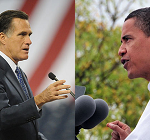Republican candidate Mitt Romney won the first U.S. Presidential Debate on 3 October 2012 in Denver, Colorado. It was focussed on how to fix the U.S. economy.
Romney looked across with a half smile at incumbent President Barack Obama throughout the 90 minutes. There were no commercials and no sparks in this show. The President and Romney politely disagreed over more or less spending on national programmes like education and health care, and on the correct way to make tax cuts. They took as much time as they wanted, despite the pleas of moderator Jim Lehrer to limit their responses to two-minutes.
Obama looked more serious and stared down at his lectern through much of the evening. Romney’s demeanour suggested he was having fun. Both were on split screens – meaning viewers could see every twitch of a black president and a Mormon challenger – a far cry from the days when all candidates were white Protestants or John F. Kennedy, the lone Catholic. Romney was in a hole before the telecast, down from 3% to 9% in polls in key “swing states” – the states he needs to win to get a majority of the electoral votes. Polls after the event showed that Romney won by double digit margins.
No one can tell if the debate performance will help Romney in the actual election on 6 November. Studies of past campaigns show that such debates make little difference. But if likeability is a factor, and polls show that Obama is personally more liked, Romney’s debut certainly enhanced his image. Far from appearing uptight and scripted, he came across as relaxed and friendly with the President, as someone only opposed to Obama’s “direction for the country.”
Still, since the President and Romney were coached for days before, in reality both were delivering a highly scripted performance while appearing to be extempore. Obama, an amazing orator when reading off a teleprompter, seemed slightly stiff while answering questions off-the-cuff. In contrast, Romney’s affected casualness suggested confidence in his policy positions.
Both candidates concentrated on what they could do for the middle class, avoiding barbs about who was helping the rich and who cared more about the poor. At one point Romney, considered by the media to be Wall Street’s guy, slammed Obama for giving a big “kiss” to the nation’s “too big to fail” mega banks. Romney said he would lessen regulations on smaller and regional banks to boost lending, leaving open how tough he might be on the big guys. He said he would do the same for small business, which both candidates agree is the engine that creates the most jobs in the U.S.
Foreign policy came up only briefly. Romney said he would expand trade pacts with Central America, and with countries that sought such pacts, and “crack down on China if and when they cheat.” Romney has previously also said he will take measures against China for currency manipulation. But nobody talked about Israel—an issue on which Romney is a hawkish supporter, or the conflagration in the Middle East, or about India, the South China Sea, Russia, or the withdrawal of troops from Afghanistan and Iraq.
Obama did target Romney’s support for maintaining high defence spending; he said that Romney favoured spending which even the generals said they don’t need. Obama vowed to use the money from ending the two wars to fund education in the U.S.
Foreign policy will be a theme during the next round of debates between the presidential candidates on October 16 and 22. The vice presidential candidates, Joe Biden with Obama, and Paul Ryan with Romney, will debate foreign policy on October 11.
The biggest change in this first debate was the way both candidates moderated differences about government and the private sector. Both fully supported Social Security, the government pension system, which conservatives once wanted to privatise. Romney was in favour of health care and education programmes being run by the states, but with guidance from Washington. He endorsed financial regulation, but with a lesser emphasis on smaller firms and business.
Obama stood for more Federal standards, but agreed that private hiring is vital to push up the economy. Arguing for energy independence, Romney strongly backed drilling for oil and gas on government land, endorsed building a controversial gas pipeline from Canada and said “I love coal” – all areas where Obama has been cautious. Obama also backed energy independence but wants to keep drilling away from Federal lands.
What all of this means for the world is that both candidates want to separate themselves from the extremes and the vitriolic rhetoric of their campaign advertisements, even though each of them approved of their party’s advertisements.
An economic recovery for the U.S. is underway, even if it is uneven, while Europe and China continue to struggle. The U.S. is increasingly turning to home-grown jobs insulated from international shocks. Drilling for natural gas, for example, is creating jobs across the upper, middle and far west of the country, and low interest rates are finally stirring the market for housing. The drilling and construction sectors create jobs quickly in a nation that exports most of its manufacturing jobs.
Changes such as these are on automatic pilot. So no matter what a candidate promises now, the next person in the White House is likely to be riding on a built-in recovery. This will give him some room to make popular changes in schooling, science and health services, which can create a historical legacy.
Bob Dowling is Editorial Advisor to Gateway House: Indian Council on Global Relations.
This article was exclusively written for Gateway House: Indian Council on Global Relations. You can read more exclusive content here.
For interview requests with the author, or for permission to republish, please contact outreach@gatewayhouse.in.
© Copyright 2012 Gateway House: Indian Council on Global Relations. All rights reserved. Any unauthorized copying or reproduction is strictly prohibited.


